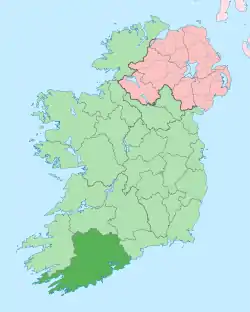Cobh
Cobh (/ˈkoʊv/ KOHV, Irish: An Cóbh), known from 1849 until 1920 as Queenstown, is a seaport town on the south coast of County Cork, Ireland. With a population of around 13,000 inhabitants, Cobh is on the south side of Great Island in Cork Harbour and home to Ireland's only dedicated cruise terminals. Tourism in the area draws on the maritime and emigration legacy of the town. It was also associated with the RMS Titanic, which was built in Belfast, Northern Ireland.
Cobh
an Cóbh | |
|---|---|
Town | |
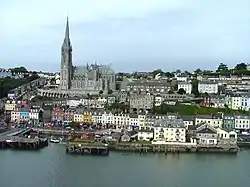 | |
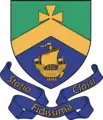 Coat of arms | |
| Motto(s): Statio Fidissima Classi ("The Fleet's Safest Post") (Latin) | |
 Cobh Location in Ireland | |
| Coordinates: 51.851°N 8.2967°W | |
| Country | Ireland |
| Province | Munster |
| County | County Cork |
| Dáil Éireann | Cork East |
| Area | |
| • Urban | 5.1 km2 (2.0 sq mi) |
| Elevation | 47 m (154 ft) |
| Population (2016)[1] | |
| • Town | 12,800 |
| • Density | 2,521.9/km2 (6,532/sq mi) |
| Time zone | UTC±0 (WET) |
| • Summer (DST) | UTC+1 (IST) |
| Eircode routing key | P24 |
| Telephone area code | +353(0)21 |
| Irish Grid Reference | W793666 |
| Website | visitcobh |
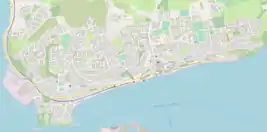
Facing the town are Spike and Haulbowline islands. On a high point in the town stands St Colman's, the cathedral church of the diocese of Cloyne. It is one of the tallest buildings in Ireland.
Name
The port, which has had several Irish language names, was first called "Cove" ("The Cove of Cork") in 1750. It was renamed by the British as "Queenstown" in 1849 to commemorate a visit by Queen Victoria. The name was changed to Cobh, during the Irish War of Independence, following the passing of a motion by the local administrative council on 2 July 1920.[2][3] Cobh is a Gaelicisation of the English name Cove, and it shares the same pronunciation. It has no meaning in the Irish language.
In ancient times the area was known as Cuan an Neimheadh (the Harbour of Neimheidh), a figure in medieval Irish legend. Great Island was called Oileán Ard Neimheidh (the high or important island of Neimheidh).[4]
History
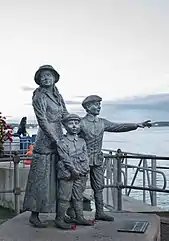
Early history
According to legend, one of the first colonists of Ireland was Neimheidh, who landed in Cork Harbour over 1,000 years BC. He and his followers were said to have been wiped out in a plague, but the Great Island was known in Irish as Oilean Ard Neimheadh because of its association with him. Later it became known as Crich Liathain because of the powerful Uí Liatháin kingdom, who ruled in the area from Late Antiquity into the early 13th century. The island subsequently became known as Oilean Mor An Barra (the Great Island of Barry & Barrymore), after the Barry family who inherited it.
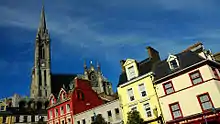
The village on the island was known in English as Ballyvoloon, overlooking "The Cove". In 1743 the British built a fort, later to become known as Cove Fort, to the east of the village.[5] The settlement was first referred to as Cove village in 1750 by Smith the historian who said: "it was inhabited by seamen and revenue officials". The Cork directory of 1787 shows about thirty businesses in the town, including one butcher and one draper.
The Water Club established at Haulbowline in 1720 was the progenitor of the present Royal Cork Yacht Club (RCYC, now based in Crosshaven) and is the oldest yacht club in the world. The RCYC was based for many years in Cobh and the present Sirius Arts Centre used to be a clubhouse of the RCYC organisation. In 1966, the RCYC merged with the Royal Munster Yacht Club, retaining the name of the RCYC but moving its headquarters to those of the RMYC at Crosshaven at the other side of the harbour.
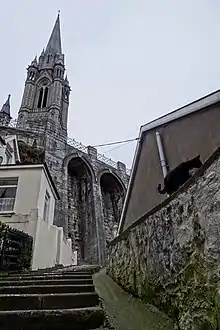
19th century
International upheaval led to Cobh undergoing rapid development in the early 19th century. Due to the natural protection of its harbour setting, the town became important as a tactical centre for naval military base purposes, never more so than at the time of the Napoleonic Wars . Today, the Irish Naval Service headquarters is on Haulbowline Island facing Cobh.
The wars against the French led to the town, then usually known as Ballyvoloon or The Cove of Cork, being developed as a British naval port assigned an admiral. Many of the present-day buildings date from this time of build up. George Brodrick, 5th Viscount Midleton engaged the English architect Decimus Burton to improve the streetscape and buildings during the 1840s.[6][7] The eventual cessation of hostilities dented Cobh's prosperity for a while, but it soon became known as a health resort; many patients stayed here for their health because of the temperate climate. Amongst their number was Charles Wolfe, who wrote "The Burial of Sir John Moore After Corunna". Wolfe's body is buried in the Old Church Cemetery outside the town.
RMS Titanic
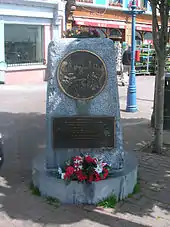
One of the major transatlantic Irish ports, the town was the departure point for 2.5 million of the six million Irish people who emigrated to North America between 1848 and 1950. On 11 April 1912, as Queenstown, it was the final port of call for the RMS Titanic before she set out across the Atlantic on the last leg of her maiden voyage. She was assisted by the P.S. America and the P.S. Ireland, two ageing White Star Line tenders, along with several other smaller boats delivering first-class passengers' luggage. Some sources and local lore suggest that a Titanic crew member, John Coffey, a native of Queenstown, left the ship at this time, thereby saving his life.[8] 123 passengers boarded at Queenstown, with only 44 surviving the sinking.
Penal transportation
Cobh was earlier a major embarkation port for men, women and children who were deported to penal colonies such as Australia. The records of such deportations can be found in ships' log books in the Cobh Museum. Since 1973 it has been housed in Scots Church (a Presbyterian church until its 1969 closure), which overlooks the harbour where so many departed.
Shipbuilding
A significant shipbuilding industry was developed in the town. The remnants of the Verolme Shipyard today maintain many of the original cranes and hoists now forming part of an industrial and maritime heritage.
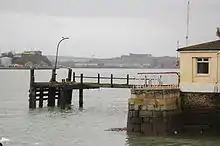
The age of steam brought Cobh association with several milestones, including the first steam ship to sail from Ireland to England (1821) and the first steam ship to cross the Atlantic (Sirius 1838), which sailed from Passage West.
In 1849, the name of the town was changed to Queenstown, to honour Queen Victoria who had visited Ireland during that year.
RMS Lusitania and the First World War
Another ship to be associated with the town, the Cunard passenger liner RMS Lusitania, was sunk by a German U-boat off the Old Head of Kinsale while en route from the US to Liverpool on 7 May 1915. 1,198 passengers died, while 700 were rescued. The survivors and the dead alike were brought to Queenstown, and the bodies of over 100 who perished in the disaster lie buried in the Old Church Cemetery just north of the town. The Lusitania Peace Memorial is located in Casement Square, opposite the arched building housing the Cobh Library and Courthouse.
.jpg.webp)
During the First World War, Queenstown was a naval base for British and American destroyers operating against the U-boats that preyed upon Allied merchant shipping. Q-ships (heavily armed merchant ships with concealed weaponry, designed to lure submarines into making surface attacks) were called Q-ships precisely because many were, in fact, fitted-out in Queenstown. The first division of American destroyers arrived in May 1917, and the sailors who served on those vessels were the first American servicemen to see combat duty in the war. When that first convoy arrived in port after enduring a rough passage in what were little more than open boats, its members were met by a crowd of sailors and townspeople, thankful for their anticipated help towards stopping the U-boats that were blockading western Europe. Admiral Sir Lewis Bayly, commander of the Coast of Ireland station, met the senior American officer, Commander Joseph Taussig, at the dock and inquired as to how soon the weatherbeaten American ships could be put to use. "We're ready now, sir!" was the widely quoted answer from the American.
The United States Navy established U.S. Naval Air Station Queenstown in February 1918. It operated flying boats during the last months of WW1, and closed in April 1919.[9]
Due to its tactical military importance, under the terms of the 1921 Anglo-Irish Treaty, the port remained a UK sovereign base within the Irish Free State after 1922. Along with the other Treaty Ports, it was handed over to the government of the Irish Free State in 1938.
Economy and tourism

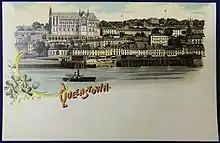
Tourism is a large employer in Cobh. Large cruise liners visit Cobh each year, mainly during the summer months, although many of the tourists are transported out of Cobh by bus to other tourist destinations. In all, almost 100,000 cruise liner passengers and crew arrive in the town each year when their ships berth right in the centre of the town at the Republic of Ireland's only dedicated cruise terminal. Tourist attractions are focused on the maritime and emigration legacy of the town and include the Queenstown Story at the Cobh Heritage Centre, Titanic Experience, Titanic Trail walking tour, Cobh Museum, Cobh Road Train, Spike Island tours and St Colman's Cathedral. The town has remained largely unchanged since RMS Titanic departed from Cork Harbour in 1912, with the streetscape and piers still much the same. Facing the town are Spike Island and Haulbowline Island. The latter is the headquarters of the Irish Naval Service, formerly a British naval base.
Cobh was home to Ireland's only steelworks, the former state-owned Irish Steel works which was closed by its buyer, Ispat International, in 2001. There is a controversy over the slag heap on the steelworks, where there are concerns that it may be leaching into the harbour.[10] Another important employer in Cobh was the Dutch-owned Verolme Cork Dockyard, in Rushbrooke. It opened in 1960 but ceased operations in the mid-1980s. In 1981 the MV Leinster was built at Verolme for service on the Dublin – Holyhead route.[11] The last ship built at Verolme was the Irish Naval Service's LÉ Eithne (P31).[12] Ship repair work is still carried at Rushbrooke using the drydock and slip way carriages. The drydock pumps date from 1912.
In the 21st century, a number of new developments were completed, such as a new retail park at Ticknock in 2008, and a leisure centre (with 25m swimming pool) in August 2007. In 2010, tours of Spike Island commenced, with tours leaving from Kennedy Pier, near the town centre.
Transport
Rail
Outside of the Dublin metropolitan area, Cobh is one of the few towns in Ireland served by a commuter train service. The town is one of two termini for Cork Commuter Services. The other is Midleton. Regular commuter services run between Cork city and Cobh, calling at, among others, Fota railway station, Carrigaloe railway station, and Rushbrooke railway station, along the way. Trains run every day and the journey time to Cork is under 25 minutes.
Cobh railway station opened on 10 March 1862 and was closed for goods traffic on 3 November 1975.[13]
Air
The nearest airport is Cork Airport, which can be reached in 20–30 minutes from Cobh via the R624 road and the N25 road.
Port
The Port Operations Centre for Cork Harbour is located in the town. The port's harbour pilot launches are based at the Camber - a pier and dock are at the eastern end of the town.
Roads
Currently there is only a single road and road bridge that leads onto the Great Island. This road bridge, Belvelly Bridge, was built in 1803 at one of the narrowest points in the channels around Great Island.[14][15]
Local government and politics
While local administration was overseen by Cobh Town Council for some years, this local government body was abolished in 2014.[17] Since then, the town has fallen within the area of responsibility of Cork County Council.[18] Cobh Municipal District, one of eight municipal districts overseen by the council, is represented by six elected councillors. As of 2019, these include 1 Labour Party, 2 Fine Gael, 1 Fianna Fáil, 1 Green Party and 1 independent councillor.[19] The town is also part of the Dáil constituency of Cork East.
Arts and culture
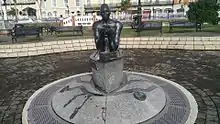
The Sirius Arts Centre is a hub for the arts in Cobh and is located on the waterfront. It hosts cultural events and music concerts both in-house and around Cobh.[20]
The Cobh Peoples Regatta is held every year around August,[21] and includes on-stage performances from local musicians and performers as well as a pageant to decide the 'Regatta Queen'. The festival typically ends with a fireworks display over the harbour.[22]
Cobh was the setting for the 2009 Connor McPherson film The Eclipse,[23] and also used as a filming location for the 1999 movie Angela's Ashes.[24]
Education
Cobh has several primary and secondary schools including Colaiste Muire secondary school and Cobh Community College. Scoil Iosaef Naofa is a boys primary school in the town, and has reached the Sciath na Scoil finals (in hurling and gaelic football) on several occasions.[25]
Sport
Cobh GAA is the local GAA club, and has a centre for gaelic games at Carrignafoy.[26]
Cobh Pirates RFC are the town's rugby union club, and compete at underage and other levels.[27] The club celebrated its 125th anniversary in 2015.[28] They play their home games at 'The Paddocks' in Newtown, where facilities include a gym, two playing pitches, a training pitch and a rubber training surface. The Cobh Pirates Ladies team was formed circa 2010.[27]
The most noted association football (soccer) team in the area is Cobh Ramblers, where Roy Keane started-out before transferring to English side Nottingham Forest, and Stephen Ireland started his career with the club's underage, Springfield Ramblers. Cobh Ramblers play in the League of Ireland First Division,[29] with home games at St Colman's Park.[30] Another local football team, Springfield AFC, based at Pat O'Brien Park, Ballyleary, has both junior and senior football teams.
Cobh Golf Club has an 18-hole championship course at Marino on the main R624 road into the town. Cobh is also home to one of the oldest existing tennis clubs in Ireland, Rushbrooke Lawn Tennis & Croquet Club, founded in 1870.[31]
There are two coastal rowing clubs in the area, Cobh Fishermen and Rushbrooke Rowing Club, with the latter established in 1989.[32] Other events on the water include the "Escape from Spike Island" triathlon, which was first held in 2012 and organised by Cobh Triathlon Club. It takes place annually in late summer, with both Olympic distance and sprint distance courses. The first "Great Island 10" (a 10-mile road race) took place on 18 April 2010, to raise funds for the Irish Cancer Society.
Notable people
- Anne Elizabeth Ball (1808–1872) and Mary Ball (1812–1898), sisters and scientists in the history of phycology[33]
- Robert Ball (1802–1857) brother of Anne and Mary Ball, zoologist[34]
- Decimus Burton (1800–1881), English architect and designer of much of Cobh's streetscape[35]
- Nellie Cashman (1845–1925), gold prospector and philanthropist who was born near Cobh or at Midleton[36]
- Patsy Donovan (1865–1953), major league baseball player in the US[37]
- Charles Guilfoyle Doran (1835–1909), Fenian and clerk of works for the building of Cobh Cathedral, lived in the town most of his life
- Jack Doyle (1913–1978), boxer, actor and singer[37]
- Frederick Edwards (1894–1964), recipient of the Victoria Cross[38]
- Joe English (sailor), Round the world sailor and international yachtsman.[39]
- Robert Forde (1875–1959), Antarctic explorer[37]
- Maeve Higgins, comedian[37]
- Stephen Ireland, Stoke City footballer[37]
- Roy Keane, former Manchester United footballer, started his professional career with Cobh Ramblers[40]
- Sean McLoughlin, Hull City footballer[41]
- Elizabeth Louisa Moresby (1862–1931), fantasy writer[42]
- John O'Flynn, footballer[43]
- Fergus O'Rourke (1923–2010), zoologist resident in Cobh while Professor at University College Cork[37]
- Thomas H. O'Shea (1898–1962), Irish Volunteer and labour leader[44]
- Sonia O'Sullivan, silver medalist in the 5000 m race at the 2000 Sydney Olympic Games[37]
- Fiona Shaw, actress, born here in 1958[45]
- Sinéad Sheppard, local councillor and former member of pop band Six[46]
- Sir Geoffrey Vavasour, 5th Baronet (1914–1997), first-class cricketer and Royal Navy officer
- James Roche Verling (1787–1858), personal physician to Napoleon Bonaparte during his exile in St. Helena
- Patrick Walsh, emeritus bishop of Down and Connor, originally from Cobh
- Joseph Wheeler, 19th century founder of the Rushbrooke ship yard
Twin towns
- Kolbuszowa, Poland[47]
- Ploërmel, France[48]
- Lake Charles, Louisiana, US[49]
- Pontarddulais, Wales[50]
References
- "Population Density and Area Size 2016". Central Statistics Office (Ireland). Retrieved 26 December 2017.
- Murphy, Elaine (25 June 2020). "100 years ago Queenstown was renamed to Cobh (Town was the last port of call of the Titanic)". TheCork.ie. Retrieved 8 July 2020.
- "Sean O'Riordan: Name reversal helped to put Cobh on the map". irishexaminer.com. Irish Examiner. 29 June 2020. Retrieved 8 July 2020.
- Samuel Lewis (1837). Lewis: A Topographical Dictionary of Ireland – Volume 1. London: Lewis – via Libraryireland.com.
- "Buildings of Ireland - Cove Fort". National Inventory of Architectural Heritage. Retrieved 9 May 2015.
- Midleton Papers, Guildford Muniments Room, ref. 1248. Cork Examiner, 26 Mar 1845. B 3, 12 Apr 1845, 170.
- "Decimus, Burton". Dictionary of Irish Architects.
- "John Coffey : Titanic Crew". Encyclopedia-titanica.org. Retrieved 31 March 2016.
- "World War 1 Era Naval Air Stations". Bluejacket.com.
- "Steel plant to close despite cost reduction deal". Eurofound.europa.eu. 2001-07-28. Archived from the original on 2012-07-29. Retrieved 2013-03-26.
- "Irish Ferries - Past Vessels". irish-ferries-enthusiasts.com. Archived from the original on 27 August 2007.
- "Eithne P31". Iol.ie. Retrieved 2013-03-26.
- "Cobh station" (PDF). Railscot - Irish Railways. Retrieved 2007-08-31.
- "Belvelly Bridge, County Cork". buildingsofireland.ie. National Inventory of Architectural Heritage. Retrieved 2 August 2018.
- "Calls for 'island designation' campaign for Cobh after Ophelia". irishexaminer.com. Irish Examiner. 18 October 2017. Retrieved 2 August 2018.
the only bridge leading into Great Island, at Belvelly [Bridge], is 200 years old
- "Passage West and Monkstown Cross River Ferry". Archived from the original on 2014-03-28.
- "Hogan says local government reform will save €420m - RTÉ News". RTÉ.ie. Retrieved 2013-11-07.
- "How your Council Works". Cork County Council.
- "Elected Members". Cork County Council.
- "Sirius Art Centre". Siriusartscentre.ie. Retrieved 7 November 2013.
- "Cobh People's Regatta". cobhpeoplesregatta.com. Archived from the original on 24 March 2018.
- "Cobh People's Regatta 2018". visitcobh.com. Cobh Tourism. 1 August 2018. Archived from the original on 5 January 2019. Retrieved 4 January 2019.
- "Cannes Is No Longer The Only Premier Film Festival By The Sea". cobhedition.com. Cobh Edition. 5 October 2012. Retrieved 4 January 2019.
- "Reconstructing the pain of the past to film a literary legend". independent.ie. Independent News & Media. 9 January 2000. Retrieved 4 January 2019.
- "Scoil Iosaef Naofa – Sciath na Scol Finalists". cobhedition.com. Cobh Edition. 20 May 2011. Retrieved 4 January 2019.
- "Cobh GAA - Contacts". cobhgaa.com. Cobh GAA. Retrieved 4 January 2019.
- "Club Focus: Cobh Pirates". munsterrugby.ie. Munster Rugby. 7 February 2014. Retrieved 4 January 2019.
- "Cobh Pirates RFC celebrates 125 years in 2015". cobhedition.com. Cobh Edition. 10 March 2015. Retrieved 9 November 2019.
- "Stephen Christopher departs Cobh Ramblers ahead of First Division run-in". extratime.ie. 25 July 2019. Retrieved 7 December 2019.
- "Cobh Ramblers land massive Dundalk home tie in cup semi-final". echolive.ie. The Echo. 14 May 2018. Retrieved 7 December 2019.
We have a 4,000 capacity in St Colman’s Park — hopefully we could fill the place up
- "Exhibition match at Rushbrooke". croquetireland.com. Croquet Association of Ireland. 23 October 2011. Retrieved 4 January 2019.
- "Rushbrooke Rowing Club History". rushbrookerc.com. Archived from the original on 18 October 2015.
- "A look back on Cobh's horticultural heroine, Anne Elizabeth Ball". irishexaminer.com. Irish Examiner. 27 February 2016. Retrieved 4 January 2019.
- "Ball | Robert | 1802-1857 | naturalist, president of the Geological Society of Ireland". Nahste.ac.uk. Archived from the original on 2012-07-14. Retrieved 2013-03-26.
- "Burton, Decimus - Biography". Dictionary of Irish Architects. Irish Architectural Archive. Retrieved 4 January 2019.
- "A miner with a heart of gold – the extraordinary Nellie Cashman". irishtimes.com. Irish Times. 28 April 2017. Retrieved 4 January 2019.
- "Famous People of Cobh". visitcobh.com. Cobh Tourism. Retrieved 4 January 2019.
- "Collection - Corporal Frederick Jeremiah Edwards VC". nam.ac.uk. National Army Museum. Retrieved 4 January 2019.
- Branigan, David (4 November 2014). "Sailor Joe English (58) passes away". The Irish Times.
- "Roy Keane is returning to Cobh Ramblers (for one night only though)". sportsjoe.ie. Sports Joe. 12 February 2015. Retrieved 4 January 2019.
- "Cobh's Sean McLoughlin in Irish U21 side to face Israel & Germany". cobhedition.com. Cobh Edition. 5 October 2018. Retrieved 6 September 2019.
- "Beck, Elizabeth Louisa Moresby". SFU Digitized Collections. Simon Fraser University. Retrieved 6 September 2019.
- "Player Profile - John O'Flynn". extratime.ie. Extratime. Retrieved 4 January 2019.
- "Mike Quill: The Irishman Martin Luther King described as 'a man the ages will remember'". irishexaminer.com. Irish Examiner. 26 January 2016. Retrieved 4 January 2019.
Quill and Thomas H O’Shea, a native of Queenstown (now Cobh), were the two main founders of the Transport Workers Union (TWU)
- "The life of Fiona Shaw". independent.ie. Independent News & Media. 11 May 2014. Retrieved 4 January 2019.
- "Our People - Cllr Sinead Sheppard Cork County Council". finegael.ie. Fine Gael. Retrieved 4 January 2019.
- "Gmina - Miasta partnerskie - Cobh (Irlandia)". kolbuszowa.pl (in Polish). UM Kolbuszowa. Retrieved 4 January 2019.
- "Cobh Ploërmel twinning" (in French). Directory of City Councils and Cities of France. Retrieved 22 March 2015.
- FlavinRealtyInc (13 October 2011), Lake Charles pairs up with Cobh, Ireland, retrieved 31 January 2018
- "Cobh, County Cork, Republic of Ireland". Pontarddulais Town Council. 13 October 2010. Archived from the original on 19 December 2012. Retrieved 2013-03-26.
External links
| Wikimedia Commons has media related to Cobh. |
| Wikisource has original text related to this article: |
 Cobh travel guide from Wikivoyage
Cobh travel guide from Wikivoyage- Cobh Tourism
- Cobh Heritage Centre
- "Cobh (Queenstown) Passenger Lists – 1895-1953". GG Archives. – Passenger Lists are Organized by Date, Steamship Line, Steamship Class of Passengers and the route of the voyage.
